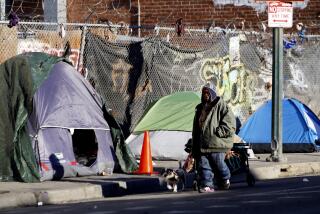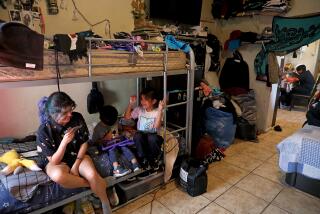Editorial: Could you live in L.A. on $221 a month?
In the early 1980s, as today, Los Angeles County residents who qualified for no other form of public assistance were given a few hundred dollars in monthly last-resort payments known as general relief. It was a lifeline to people down on their luck, hoping to cobble together a few dollars to put a roof over their heads, at least for a portion of the month. The amount in 1982 was $221.
More than 30 years later, that’s still what the county pays, despite the obvious many-fold increases over the decades in the cost of housing and other basic needs. Two general relief recipients pooling their money still can’t afford a month in a typical L.A. apartment.
And leaders wonder why Los Angeles can’t make headway against homelessness.
The orientation of county government toward its moral duty to help the most destitute of people has been grudging, to say the least. The Legislature has often been its ally, for example passing a law to permanently hold the county’s obligation to 65% of the 1994 poverty line, taking the payment from a paltry $346 back down to $221 — miserly even then.
Certain that general relief recipients were using their monthly payments to fund princely lives on the streets, county supervisors embarked on one costly mission after another to ferret out fraud and whittle the general relief rolls. People who tried to make their payments go further by becoming roommates were disqualified, for example.
The county, as has so often been the case, got caught up in the minutiae of rules and regulations while losing sight of the program’s goal, which is — or ought to be — to aid those most in need and give them a way to live without panhandling or engaging in some other troubling behavior.
A year ago, the county agreed to settle a lawsuit by correcting some of its most egregious practices. Recipients can now pool their money, for example. But Los Angeles — the county with the costliest housing — still pays the lowest general relief amount in the state.
In the budget process now underway, the Board of Supervisors is signaling a new willingness to question old rules in order to spend money more effectively and provide better service to foster children, the mentally ill and others in need. It’s high time to boost payments to general relief recipients as well. They are part of the web of need that, unaddressed, puts more people on the streets and makes the streets meaner, more hopeless places to live.
Follow the Opinion section on Twitter @latimesopinion and Facebook
More to Read
A cure for the common opinion
Get thought-provoking perspectives with our weekly newsletter.
You may occasionally receive promotional content from the Los Angeles Times.






